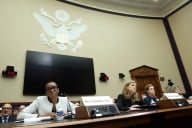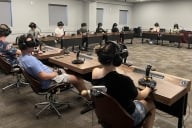You have /5 articles left.
Sign up for a free account or log in.
George Washington University administrators pushed back last week against faculty criticisms of the institution’s rapidly expanding portfolio of online programs -- rejecting the contention that the online courses are exorbitantly priced and qualitatively inferior to face-to-face offerings.
They also announced steps to address faculty criticisms about the university's management of its online portfolio -- though in some cases, administrators also rejected the scale of those criticisms.
The Faculty Senate in October issued a report arguing that the institution lacks a universitywide master list of online programs and guidelines describing how new online courses should be approved and monitored. The report came on the heels of a 2016 class action in which four former students alleged that the quality of their online courses paled in comparison to on-campus counterparts despite higher tuition.
In a memo released last week and discussed at a Faculty Senate meeting Friday, Forrest Maltzman, provost and executive vice president of academic affairs at GW, cited aggregate student evaluation data from spring 2015 to spring 2017 indicating negligible differences between face-to-face and online courses. He also pointed to GW’s high performance in national rankings of online programs, and to compliments from visiting accreditors and academic program reviewers, including the Commission on Accreditation of Healthcare Management Education.
Though Maltzman disputed the report’s tone and some of its sweeping allegations, he acknowledged the concerns it raises and offered several initiatives as potential solutions:
- Academic program reviews are now required to include separate analyses of online programs, even if the same program is also offered face-to-face.
- Courses offered at a distance must retain lecture materials for at least one semester so that schools can adequately “assess teaching performance and educational efficacy.”
- Online courses will also use the electronic tool SmartEvals -- which offers specific questions about the online format -- for end-of-semester student evaluation.
- Maltzman will send a "reminder" to academic program leaders that they are responsible for the academic integrity of all programs under their purview.
“It is important that there is a set of standards utilized university-wide, that mechanisms are instituted to ensure that monitoring is routinely done at the school level, and to make sure that online programs receive the same scrutiny that face-to-face programs receive in academic program reviews,” Maltzman wrote in the memo, first reported by The Hatchet, an independent GW student newspaper.
He also acknowledged concerns raised in the fall report that courses already approved in a face-to-face format don’t require a second approval process for conversion to online. In response, all online courses are now required to meet Quality Matters standards, all instructional designers must enroll in Quality Matters certification and training courses, and faculty members will have the option to take a Quality Matters seminar to recognize firsthand the importance of those standards.
Kurt Darr, the head of the Faculty Senate task force that released the report, wasn’t available for comment on Maltzman's memo in time for publication. The Hatchet quotes two instructors who said they remain concerned the institution isn’t adequately resolving the concerns that originally prompted the Faculty Senate report: refining online offerings and helping ensure that faculty members are properly prepared to teach online.
According to The Hatchet, Philip Wirtz, chair of the Faculty Senate’s educational policy committee and a professor of decision sciences and psychology, plans to introduce a resolution at next month’s Faculty Senate meeting that calls for more uniform standards across face-to-face and online programs.
Maltzman pushed back on Wirtz's proposal during the meeting, however. “We expect schools and their units to take the lead in setting their own expectations,” the provost wrote in the memo.








